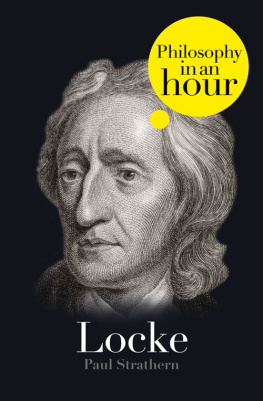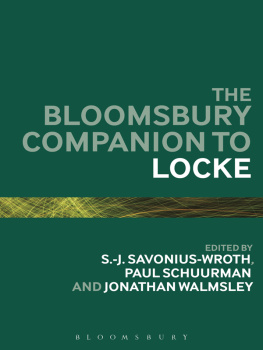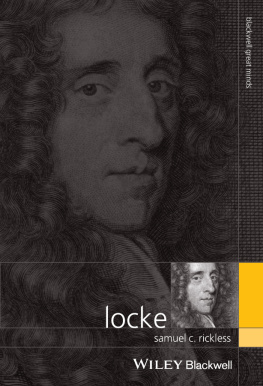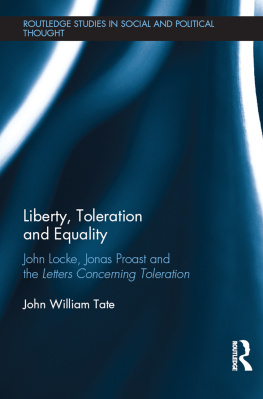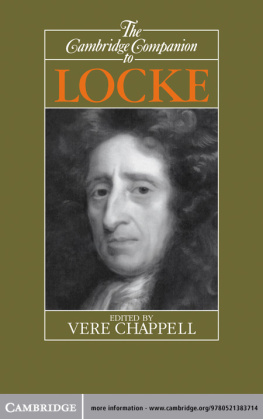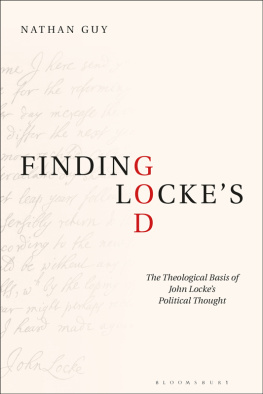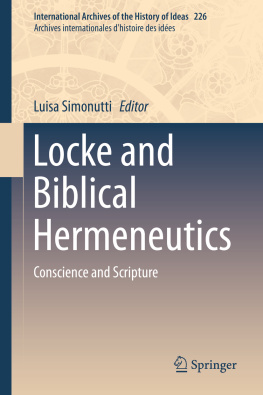Locke's Touchy Subjects:
Materialism and Immortality
Nicholas Jolley
(p.v) Acknowledgements
During the course of writing this book I have incurred a number of debts to colleagues and fellow scholars. I am very grateful to two anonymous referees for Oxford University Press for their careful criticisms of an earlier draft and for their many helpful suggestions for its improvement. I should also like to thank Sean Greenberg, Jan-Erik Jones, and Larry Nolan for numerous stimulating conversations about Locke and Descartes. I am indebted to Christopher Bobier for his comments on a version of the Introduction.
I am very grateful to Peter Momtchiloff of Oxford University Press for his interest in this project and for his advice and encouragement. I should also like to thank Sally Evans-Darby for her excellent copy-editing.
Some of the material in Chapters was originally included in an essay, Dull Souls and Beasts: Two Anti-Cartesian Polemics in Locke, in P. Glombicek and J. Hill (eds.), Essays on the Concept of Mind in Early-Modern Philosophy, Cambridge Scholars Publishing, 2010, pp. 95111. This material is here published with the permission of Cambridge Scholars Publishing.
(p.viii) (p.ix) Abbreviations
AG
R. I. Aaron and J. Gibb (eds.), An Early Draft of Lockes Essay together with Excerpts from his Journals (Oxford: Clarendon Press, 1936)
AT
C. Adam and P. Tannery (eds.), Oeuvres de Descartes, 12 vols. (Paris: Vrin, 18971913; repr. Paris: Vrin, 196476)
CL
E. S. De Beer (ed.), The Correspondence of John Locke, 8 vols. (Oxford: Clarendon Press, 197689)
CSM
J. Cottingham, R. Stoothoff, and D. Murdoch (trans.), The Philosophical Writings of Descartes, 2 vols. (Cambridge: Cambridge University Press, 1985)
CSMK
J. Cottingham, R. Stoothoff, D. Murdoch, and A. Kenny (trans.), The Philosophical Writings of Descartes: The Correspondence (Cambridge: Cambridge University Press, 1991). The Correspondence is volume III of the preceding edition.
E
P. H. Nidditch (ed.), John Locke: An Essay Concerning Human Understanding (Oxford: Clarendon Press, 1975)
ET
R. Klibansky and J. W. Gough (eds.), John Locke: Epistola de Tolerantia/A Letter Concerning Toleration (Oxford: Oxford University Press, 1968)
Lev
C. B. Macpherson (ed.), Thomas Hobbes: Leviathan (Harmondsworth: Penguin, 1968)
LW
The Works of John Locke, 10 vols. (London, 1823; repr. Aalen, 1963)
N
V. Nuovo (ed.), John Locke: Writings on Religion (Oxford: Clarendon Press, 2002)
NE
G. W. Leibniz, New Essays on Human Understanding
RB
P. Remnant and J. Bennett (trans.), G.W. Leibniz: New Essays on Human Understanding, 2nd edn (Cambridge: Cambridge University Press, 1996)
ROC
The Reasonableness of Christianity (References are to Nuovo, John Locke: Writings on Religion)
(p.x)
Introduction: Themes and Background
In the last year of Lockes life the philosopher Anthony Collins wrote to him saying that he was about to publish a book by Samuel Bold: I am going to put to the press a Book of his entituled Two Discourses 1 of the Immateriality of Created thinking substance 2 of the Resurrection of the same body (18 February 1704, CL VIII 202). In his reply Locke warned his young friend against doing so:
I desire you to stop your hand a little and forbear puting to the press the two discourses you mention they are very touchy subjects at this time and that good man who is the author may for ought I know be cripled by those who will be sure to be offended at him right or wrong. (21 February 1704, CL VIII 206)
Locke knew from experience what he was talking about. His own discussions of these touchy subjects in An Essay Concerning Human Understanding had given offence to prominent critics such as Edward Stillingfleet; if they had not left him cripled, they had at least caused the last years of his life to be overshadowed by bitter controversy.
(p.2) I Orthodox Christian Views
To understand why these subjects were touchy, it is helpful to consider the orthodox Christian conception of the afterlife in which God rewards the just and punishes sinners. Such a doctrine was really a composite of two distinct strands, one philosophical, the other scriptural. The philosophical strand is the doctrine of the soul as an immaterial substance that is naturally immortal; this doctrine of course derives from Plato and the Greek tradition, and in the seventeenth century found leading advocates in Descartes and perhaps even more clearly in Leibniz. The scriptural strand in the teaching is the doctrine of the resurrection of the dead, which was traditionally understood to involve the resurrection of the same body; this doctrine derives above all from St Pauls letters to the Corinthians. These two strands were combined into a single body of teaching according to which my soul, as an immaterial substance, survives my death until the Day of Judgment when it is united with my resurrected body.
To deny either of these doctrinesthe survival of an immaterial substance and the resurrection of the same bodywas widely considered to pose a threat to any Christian conception of the afterlife that would satisfy the demands of divine justice. Whether the presence of an immaterial substance was a sufficient condition for genuine personal immortality was controversial, but it was generally thought to be a necessary condition of the survival in an afterlife of a self that could be the subject of rewards and punishments. A materialist conception of human beings seemed to undermine the prospects of such survival. If there were no strict numerical identity of the pre-mortem and resurrected body, we would be confronted by a case of the transmigration of one soul into another body rather than by a genuine case of resurrection.
In An Essay Concerning Human Understanding and other texts such as his Letters to Stillingfleet, Locke takes up unorthodox positions on both of these touchy subjects. As we shall see, just how radical and unorthodox are Lockes views is a matter for debate, but so much at least is clear. In connection with the first of these touchy subjects, Locke is engaged in what we might call a reconciling project. Even if a weak materialist account of human beings is true, it poses no threat to the doctrine of personal immortality; in a number of contexts Locke seeks to show that personal immortality, in what we might call a morally significant sense, and the immateriality of the soul do not necessarily stand and fall together. According to Locke, the issue of the minds status as an immaterial substance is irrelevant to the issue of personal identity and any form of personal immortality that could be of interest to us. Locke addresses the second of these touchy subjects most fully in the letters to Stillingfleet. Here he makes a case on both philosophical and scriptural grounds. Locke argues that Scripture speaks of the resurrection of the dead, not the resurrection of the same body; according to Locke, such resurrection is to be interpreted in terms of the resurrection of persons; it is persons who will be punished or rewarded at the Day of Judgment. In accordance with Scripture Locke holds that such persons will indeed be embodied, but he insists that the resurrection of the same body is not required for their resurrection. Locke stops just short of saying that the resurrection of the same body is incoherent, but he is clear that it at least poses conceptual difficulties and that it has no scriptural warrant.


